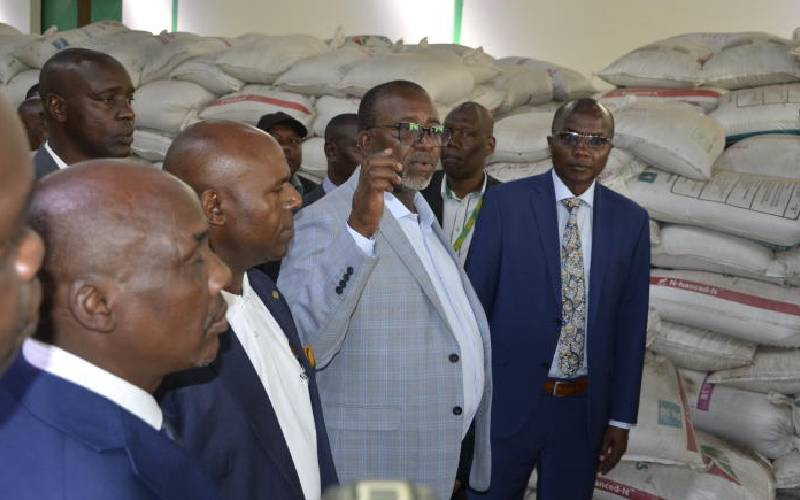By Machel Waikenda
twitter@MachelWaikenda
Though it may seem cliché, agriculture remains a key aspect of Kenya’s economy and should be given priority in 2014. And I say ‘key’ because a country is like a marching army, for whom a growling stomach and yawning granaries/silos are a greater enemy than any armed adversary.
According to the Kenya National Bureau of Statistics (KNBS) 2013 Economic Survey, agriculture, which grew by 3.8 per cent, contributed 17.6 per cent of the Gross Domestic Product.
Agriculture is expected to post even higher growth rate due to favorable conditions and will cause a ripple effect in the manufacturing and financial intermediation sectors.
According to the KNBS 2012 data, Agriculture is the number three-employment sector in the country. However, due to low production, food prices remained high and contributed to inflation and thus agriculture remained a second-class contributor to economic growth. Kenya has about 20 per cent of arable land but currently only 8 per cent is used for agricultural production. More land can be put under irrigation and greenhouse farming.
Agriculture has the potential to not only grow the economy but also create an exponentially large number of jobs than any other sector. With more young people participating in the agricultural sector, the country can harvest more food and make life more affordable for millions of Kenyans.
Today, Kenya is still importing basic commodities such as rice and sugar since our production is not sufficient to meet the demand. Putting more arable land into useful food production will help the country import less saving Kenya unnecessary expense. For instance, it is reported that the first phone call the South Korea Prime Minister makes every morning is to his Minister for Agriculture seeking to know the amount of rice in stock so that no Korean ever sleeps hungry.
Secondly, the country is in combat-ready mode against her unpredictable neighbour and must keep a sharp eye on food stocks. Third, no individual is allowed to export or deal in rice, regardless of the free market economy. Reason? No single person or institution is allowed to hold the country to ransom over its staple food. Remember folks, this is the Asian tiger economy Kenya is trying to emulate.
Young Kenyans need to be more creative especially with the scarcity of white-collar jobs. Agribusiness has great opportunities that can help millions of youth especially with the Jubilee government having promised to enhance agriculture to create jobs and ensure food security.
Other than the current Youth Development Fund and the recently introduced Uwezo Fund, young people can also take advantage of the government’s plan to introduce affordable state loans to subsidise fertiliser and farm equipment. Groups of youth can take advantage of the government plan to establish a vibrant national irrigation scheme to open up more arable land.
Government also promised to make it easier for Kenyans to lease agricultural land and provide extension services, create and encourage Agricultural Investment Trusts through tax incentives to direct private investment into the agricultural sector.
In the coming budgets, government will be seeking to triple the budgetary allocation to scientific research and information and create a framework for technology transfer to enhance agricultural productivity. This is already cast in stone and commendable work-in-progress.
The Jubilee manifesto also promises that government will initiate and support a county-level framework for value addition through processing of livestock and agricultural products at source to maximise returns to farmers.
Over the years, we have seen millions of young people move to the cities searching for those elusive jobs. It is time we encouraged a reverse exodus (urban-to-rural migration) in an agriculture-based economy. Yes, agricultural production can become the new sexy. Young people can incorporate ICT into agricultural production.
Tech-savvy youths can help the country in research to enhance agri-business data in the country such as emerging markets and demand for exports. Yes, the land is beckoning as the next frontier for sustained development and solution to absorbing the mass of Kenyan youth.
Stay informed. Subscribe to our newsletter
 The Standard Group Plc is a
multi-media organization with investments in media platforms spanning newspaper
print operations, television, radio broadcasting, digital and online services. The
Standard Group is recognized as a leading multi-media house in Kenya with a key
influence in matters of national and international interest.
The Standard Group Plc is a
multi-media organization with investments in media platforms spanning newspaper
print operations, television, radio broadcasting, digital and online services. The
Standard Group is recognized as a leading multi-media house in Kenya with a key
influence in matters of national and international interest.
 The Standard Group Plc is a
multi-media organization with investments in media platforms spanning newspaper
print operations, television, radio broadcasting, digital and online services. The
Standard Group is recognized as a leading multi-media house in Kenya with a key
influence in matters of national and international interest.
The Standard Group Plc is a
multi-media organization with investments in media platforms spanning newspaper
print operations, television, radio broadcasting, digital and online services. The
Standard Group is recognized as a leading multi-media house in Kenya with a key
influence in matters of national and international interest.









